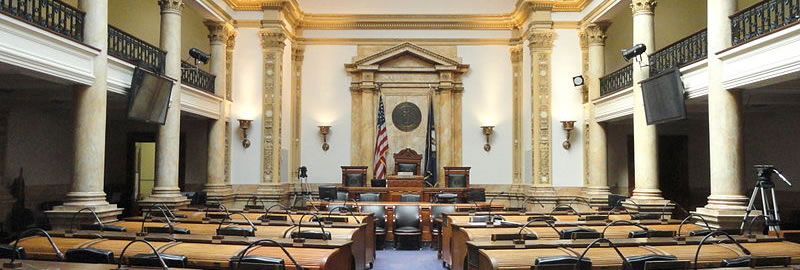Legislative session closes with new higher education bills in the books
May 02, 2022

The 2022 Regular Session of the Kentucky General Assembly adjourned April 14, and CPE has been tracking the legislation that impacts postsecondary education. Here’s a breakdown of that legislation:
Name, Image, Likeness: Senate Bill 6 provides a process and framework for college athletes to receive income from the use of their name, image and likeness with protections for both athletes and institutions.
Teacher Prep and Literacy Outcomes: Senate Bill 9 requires postsecondary institutions offering early childhood or elementary teacher preparation programs to include evidence-based reading instructional programming in phonemic awareness, phonics, fluency, vocabulary and comprehension with the goal of improving early literacy outcomes for students in kindergarten through the third grade.
Nurse Education: Senate Bill 10 prohibits the Board of Nursing from restricting student enrollment numbers if the school or program has at least an 80% average pass rate for the NCLEX. It describes nursing education levels needed to teach at various types of nursing programs. The bill removes barriers for nurses from outside Kentucky to practice in the state with the goal of helping address severe nursing shortages.
Transgender Athletes: Senate Bill 83 requires postsecondary institutions to prohibit biological males as assigned at birth from participating in women’s sports or athletic activities.
Work Ready Scholarship: Senate Bill 94 makes students with intellectual disabilities enrolled in comprehensive transition and postsecondary programs eligible for the Work Ready Kentucky Scholarship Program and removes limits on receiving the scholarship for four academic terms.
Charter Schools: House Bill 9 establishes the Kentucky Public Charter School Pilot Project and permits the Northern Kentucky University board of regents to become a pilot project authorizer. It requires at least one charter authorization in Louisville and northern Kentucky and requires the Office of Education Accountability to review their performance. HB 9 permits local and state funding to follow students from their current public school to their public charter school.
Teacher Certification: House Bill 277 creates an alternative certification pathway for teacher candidates using a residency program and “grow your own approach.” It requires the residency program to partner with an accredited university to develop an expedited certification program that allows candidates to earn bachelor’s degree and initial certification within three school years.
Student Due Process: House Bill 290 requires public colleges and universities to adopt a student code of conduct for non-academic disciplinary procedures and grant students certain due process protections.
Student Loan Servicing, Licensing and Protection: House Bill 494 establishes licensing requirements for certain student education loan servicers and prohibits them from engaging in abusive acts and practices.
College and University Financial Disclosure: House Bill 663 requires the president and chair of the governing board of each public postsecondary education institution and Kentucky independent institutions to jointly execute a signed, sworn financial disclosure statement and submit it to CPE and the General Assembly by June 30 of each year. It authorizes CPE to investigate if an institution fails to provide a statement to designated recipients.
KERS Exemption: House Bill 668 exempts contracts for non-core services provided by an independent contractor used by a Kentucky Employees Retirement System quasi-governmental employer (including all KERS participating comprehensive universities and KCTCS) from reporting requirements that determine recommendations for KERS general fund subsidies.
Last Updated: 5/4/2022
